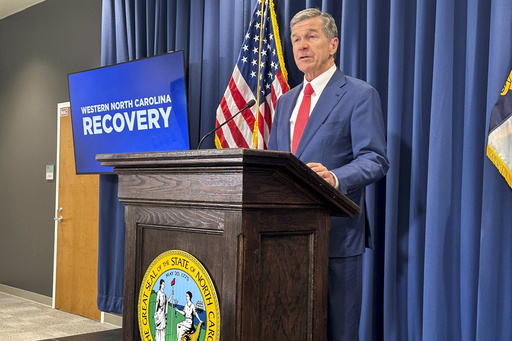
RALEIGH, N.C. — As North Carolina state lawmakers reconvene on Thursday, their focus is on additional relief efforts in response to Hurricane Helene, which significantly impacted the region. They have received a detailed assessment of the financial implications of the extensive flooding caused by the storm, along with a request from Governor Roy Cooper outlining necessary expenditures for recovery initiatives.
The Republican-led General Assembly has planned a brief session to discuss further funding and legislative measures aimed at disaster recovery. This comes four weeks after Helene swept through the Southeast, particularly affecting the mountainous regions of western North Carolina.
Earlier this month, state lawmakers came together to pass an initial relief package, which Governor Cooper promptly signed into law. This measure allocated $273 million, primarily designated as the state’s matching contribution for federal disaster assistance programs. Legislators indicated that this funding was just the beginning of their efforts to respond to the storm’s devastation.
The impact of Hurricane Helene has been tragically underscored by the reported 96 fatalities stemming from the storm, accompanied by unprecedented flooding in late September.
On the day prior to the session, Governor Cooper presented lawmakers with a proposal requesting $3.9 billion to aid in recovery and repairs. This request was articulated in a report from his Office of State Budget and Management, which estimated that Helene’s destruction could result in damages totaling at least $53 billion, the highest recorded for the western North Carolina area.
According to Cooper, the previous most significant financial toll from a storm was $17 billion following Hurricane Florence, which struck eastern North Carolina in 2018. The state’s financial resources appear robust, with billions accessible for future recovery efforts, including approximately $4.5 billion in the state’s savings reserve.
Among the various requests outlined by Cooper, significant allocations include $475 million for a grant recovery program specifically targeting businesses in the areas most severely affected; $325 million designated for homeowners and renters to expedite rebuilding efforts and minor repairs; $225 million aimed at providing grants to farmers suffering uninsured losses; and $100 million intended for the capital needs of public schools and community colleges.
The aftermath of the storm has highlighted deep vulnerabilities, particularly within the agricultural sector and among homeowners, with many not covered by crop or flood insurance. The budget office reports that the hurricane has resulted in 1,400 landslides and has inflicted damage on more than 160 water and sewer systems, approximately 6,000 miles of roads, over 1,000 bridges and culverts, as well as an estimated 126,000 homes.
